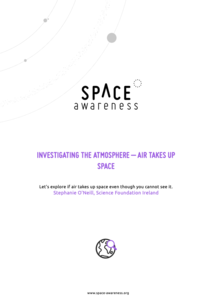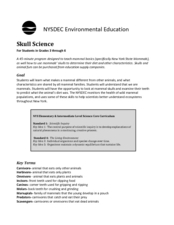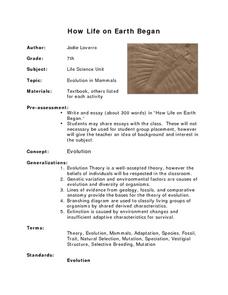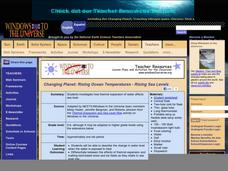ReadWriteThink
Webcams in the Classroom: Animal Inquiry and Observation
Boost observational skills with an inquiry-based instructional activity that takes scholars on a virtual field trip. With help from webcams, learners observe animals in a zoo or aquarium. Observations go into a journal and a discussion...
National Science Teachers Association
Hop into Action
Young scientists find out what makes amphibians such unique and interesting animals in this simple life science lesson plan. After looking at pictures and discussing the characteristics of amphibians, learners complete a...
NOAA
Biological Oceanographic Investigations – Call to Arms
How many simple machines does it take to make a robotic arm? An inquiry-based lesson explores that topic and challenges pupils to build a robotic arm that can stretch, turn, and more. A few questions help guide them in the...
Curated OER
Marine Biology Field Trips
Learners visit a Marine Biology study area 2-3 times and write a report after the last visit. They participate in the Marine Biology field trips working with lab partners. They complete data sheets to write their primitive environmental...
Space Awareness
Investigating the Atmosphere - Air Takes Up Space
How do you know there is air? Can you see it, smell it, feel it? To begin the investigation, learners watch a video and discuss what they know about air and the atmosphere. Then, they participate in five different hands-on, inquiry-based...
National Nanotechnology Infrastructure Network
Creating and Testing Silver-Nanoparticle Socks
Antibacterial socks are a product of nanotechnology. An inquiry-based lesson plan asks collaborative groups to create their own antibacterial socks and then test them against other products on the market. The sock with the least...
Berkshire Museum
Meet a Naturalist: Researching, Writing, Interviewing
Young scholars reach out into the community and learn about different environmental science careers in this inquiry-based instructional activity. Beginning with a short research assignment, children gain background knowledge about...
Curated OER
Skull Science
What can your class learn from a skull? With proper facilitation, they can learn about diet, physical adaptations, special differences, and even the environment. Pupils will examine a series of mammal skulls and pelts to help them...
Space Awareness
History of the Universe
Your pupils may believe that you and their parents are the oldest things in the universe, but surprise! There are elements of the universe that are even older. Elementary scientists create a class timeline to demonstrate the...
Curated OER
Designing a Real Life Ecosystem!
Learners research abiotic and biotic factors concerning the concept of an ecosystem. Record and analyze data collected. Write a lab report in proper and scientific format with thinking and analytical skills. Work as a cooperative team.
Curated OER
A Frog's Life Story
Students investigate the lives of frogs by completing several worksheets. In this biology lesson, students discover the life cycle of a frog from tadpole to death. Students complete frog life cycle puzzle as well as create a...
Science 4 Inquiry
The Ups and Downs of Populations
Life has its ups and downs ... especially if you're an animal! Biology scholars engage in a population study through an inquiry-based lesson. Pupils work together to explore the factors that affect deer populations, then examine the...
Mascil Project
Epidemics: Modelling with Mathematics
The Black Death epidemic is responsible for more than one million deaths in the United Kingdom. An inquiry-based activity has young scholars explore the rate of disease spread. They then analyze graphs showing data from epidemics such as...
Curated OER
Marine Life Research and Persuasive Conservation Pamphlet
Tenth graders examine conservation and research a type of fish that is under environmental stress. In this conservation instructional activity students create a pamphlet about the conservation of a marine organism.
Curated OER
The Origin of Life: Alternative Views
Learners explore the topics of faith and science as they relate to the origins of life. They consider the major points of Darwin's Theory of Evolution and brainstorm various explanations of how life began. Students investigate different...
University of Georgia
Antacid and Uncle Heartburn
Household materials can be used for more than cleaning! In this collaborative experiment, emerging chemists use products such as vinegar and liquid antacid to explore chemical reactions that commonly occur in the human body.
Curated OER
Colds and Germs
Students determine how diseases are spread from one person to another. They investigate the importance of hand washing to reduce the spread of common colds and other diseases. They listen to teacher read alouds and complete an inquiry...
Curated OER
How Life on Earth Began
Seventh graders investigate the concept of evolution and how it was a mechanism for the foundation of life on Earth. They conduct research and attempt to make cognitive connections with the evidence to agree with the presupposition of...
Curated OER
Investigate Pine Creek!
Students are invited to become detectives in this Web-Integrated Science Environment (WISE) as they explore a local creek, its environment and ongoing status. Students participate in field trips, acquisition of data through water testing...
Curated OER
Antibiotics: Will They Work?
Students examine why antibiotics are important in everyday life. They examine the decisions that people make and how these decisions can artificially speed up natural selection in bacteria that cause infections such as group A...
Curated OER
Genetically Modified Foods in Perspective
Students research the concept of genetically modified foods. The purpose of the research is to increase science content knowledge and comprehension of the controversy surrounding the subject.
Science 4 Inquiry
Eukaryotic Cells: The Factories of Life
Eukaryotes include humans, animals, and plants. Scholars learn about the parts of eukaryotic cells. They design models of a store and match the correct function of each part to the function of a part of the cell. They review their...
Curated OER
Animal Coverings
Learners compare and contrast the types of coverings found on animals. They identify a wide variety of animals in a museum room. They classify animals based on their coverings as well.
Curated OER
Changing Planet: Rising Ocean Temperatures - Rising Sea Levels
As an anticipatory set, young environmental technicians watch a video about how ocean temperatures seem to be changing along with the global climate. They perform a laboratory demonstration with the purpose of observing what happens to...

























